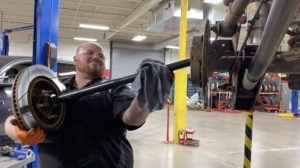While upgrading my vehicle, I came across optional components mentioning different metal alloys. Curiosity got the better of me, and I dive right into what makes an axel shaft, stronger over an OEM one.
One of the options I started to notice was something called Chromoly. Basically the difference between Chromoly(4130) and a normal medium carbon(1040) is the composition of the metal itself. To compare these two, a 1040 will have a yield strength of around 42,000 PSI where a Chromoly has a yield strength of either 75,000 PSI (4130) or 125,000 PSI (4340) which is usually used in autoparts.

Chromoly steel is a type of low alloy steel that gets its name from a combination of the words “chromium” and “molybdenum” – two of the major alloying elements. Chromoly steel is often used when more strength is required than that of mild carbon steel, though it often comes at an increase in cost. Chromoly falls under the the AISI 41xx designations, and it is important to be aware of the different properties and applications of chromoly steel when deciding which material you need.
This alloy, 4340, may be heat treated to high strength levels while maintaining good toughness, wear resistance and fatigue strength levels, combined with good atmospheric corrosion resistance, and strength.

This little reading material helped me understand why and when one my need to start investing on some better parts for axles, shafts, tie rods, drive links, etc that are made stronger and would have a longer life.
By Big AL PDX
email:bigalpdx@oregonoffroadrecovery.com
follow BigAl at @bigalpdx
videos: YouTube Channel


